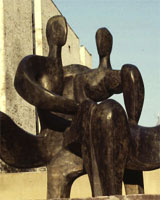
|
|
Sculpture at UNESCO Headquarters © UNESCO |
The potential of media in fostering dialogue, mutual understanding and reconciliation will be the topic of UNESCO World Press Freedom Day 2009 to be celebrated on 2-3 May 2009. As the only UN agency with a mandate to defend freedom of expression and press freedom, UNESCO has placed mutual understanding, and dialogue through media at the core of its mission.
Indeed, UNESCO’s Constitution, adopted in November 1945, states that the Organization will “collaborate in the work of advancing the mutual knowledge and understanding of all peoples, through all means of mass communication” and “promote the free flow of ideas by word and image”.
At this year’s conference and celebrations, UNESCO invites participants to explore the enormous potential of media to serve as a platform for dialogue and a vehicle for understanding.
At this year’s conference and celebrations, UNESCO invites participants to explore the enormous potential of media to serve as a platform for dialogue and a vehicle for understanding.
| Media, dialogue and mutual understanding |
 The Role of Media in Intercultural Dialogue The Role of Media in Intercultural Dialogue
Cultural references determine our identity and the ways in which we construct reality; they affect the perception of ourselves, the way we encounter others, and the way we interact with the world. The media greatly influences not only what we think, but also how we act. >> Read more  Free Media Fosters Dialogue Free Media Fosters Dialogue
Perhaps the best way a media can work towards building mutual understanding is by strengthening the media culture itself. A media that is vibrant, independent, pluralistic, inclusive and fair, editorial free and beyond censor and influence from interests, political, commercial, or otherwise – only a free media will innately contribute to the dialogue and understanding across divides. Moreover, a media that is free is essential for the provision of information and knowledge upon which informed democratic participation and good governance depend. >> Read more  Empowering Citizenship: Media, Dialogue and Education Empowering Citizenship: Media, Dialogue and Education
Media functions as a vehicle for the flow of a plurality of viewpoints and multiplicity of voices, thus permitting exercises of citizenship such as participation, criticism and voting. Informed citizens can better and more actively participate in their societies’ decision making processes. >> Read more |
05-06-2009 (Beijing)
25-05-2009 (Kingston)
13-05-2009 (Kathmandu)
12-05-2009 (Kigali)
12-05-2009 (Kabul)
11-05-2009 (New York)
11-05-2009 (Paris)
07-05-2009 (Kingston)
05-05-2009 (Quito)
04-05-2009 (Doha)
12-03-2009 (Paris)
Senior Programme Specialist
Programme Assistant
http://www.unesco.org/webworld/en/wpfd2009






